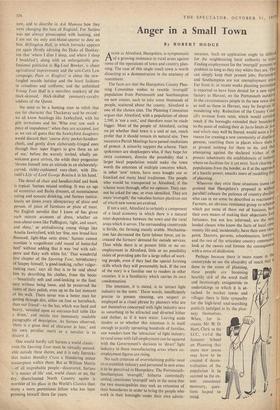Anger in a Small Town
By ROBERT HODGE ANGER at Alresford, Hampshire, is symptomatic of a growing resistance in rural areas against some of the operations of town and country plan- ning. The case of this single small town is worth dissecting as a demonstration in the anatomy of resentment.
The facts are that the Hampshire County Plan- ning Committee wishes to resettle `overspill' population from Portsmouth and Southampton on new estates, each to take some thousands of people, scattered about the county. Alresford is one of the chosen sites. The Planning Committee argues that Alresford, with a population of about 2,500, is 'not a unit,' and therefore must be made bigger. Most of the people of Alresford, caring no jot whether their town is a unit or not, much prefer that it should remain its natural size. Two successive Parish Meetings have passed resolutions of protest. A minority support the scheme. Their spokesmen are shopkeepers who, if they hope for extra customers, dismiss the possibility that a larger local population would make the town worth the attention of multiple concerns which, in other `new' towns, have soon bought out or knocked out many local tradesmen. The people who would be transported to Alresford, if the scheme went through, offer no opinion. They can- not be asked for one, or even identified. They are mere `overspill,' the voiceless human plankton out of which new towns are evolved.
If not a unit, Alresford is certainly a component of a local economy in which there and a natural a inter-dependence between the town nd the rural areas which it serves. The surrounding countryside is fertile, the farming mainly arable. Mechanisa- tion has decreased the farm labour force, yet in- creased the farmers' demand for outside services. Thus while there is at present little or no un- employment in Alresford, little or no possibility exists of providing jobs for a large influx of work- ing people, even if they had the special farming skills which they will presumably lack. If the rest of the story is a familiar one to readers in other counties, it is a familiarity which carries its own condemnation.
The intention, it is stated, is to 'attract light industry to the town.' These words, insufficiently precise to possess meaning, are suspect as employed as a ritual phrase by planners who are not themselves concerned with light industry save as something to be attracted and diverted hither and thither, as if it were water. Leaving aside doubts as to whether this intention is in itself enough to justify uprooting hundreds of families, one wonders how the `attraction' of light industry to rural areas with full employment can be squared with the Government's decision to 'direct' light industry to those manufacturing areas where un- employment figures are rising.
No such criterion of overwhelming public need to re-establish industry and personnel in new areas is to be perceived in Hampshire. The Portsmouth- Southampton `overspill,' hitherto contentedly settled, constitutes `overspill' only in the sense that the two municipalities may seek an extension of their boundaries in order to bring the people who work in their boroughs under their own admin- istration. Such an application might be difficult for the neighbouring local authority to resist Finding employment for the 'overspill' presents no ' problem so long as they stay where they are. They can simply keep their present jobs; Portsmouth and Southampton are not unemployment areas. Far from it; in recent weeks planning permission is reported to have been denied for a new nyleol factory at Havant, on the Portsmouth outskirts. In the circumstances people in the new town site, as well as those in Havant, may be forgiven 1'6 wondering why. Reduction of the County Coe cirs revenue from rates, which would certainlY result if the boroughs extended their boundaries to the point of making their de facto limits de jrert and which may well be feared, would seem a frail , reason for creating a new community of displace' persons, resettling them in places where there is at present nothing for them to do, and then attempting against the 'declared wishes of the present inhabitants the establishment of industrY, where no facilities for it yet exist. Such clearing 0' populations from the border, as if at the approach of a hostile power, smacks more of meddling than of planning. Wherever they exist these situations (none call pretend that Hampshire's proposal is without parallep'exhaust the patience of country-dwellers who can in no sense be described as reactional(' Farmers, an obvious resistance group to schemes which put some of them out of business, have their own means of making their objections. Less fortunate, but not less informed, are the nom landed classes who know the facts of local corn` munity life and, incidentally, have their own via,' point. Doctors, parsons, schoolmasters, lawyers, and the rest of the articulate country community look at the causes and foresee the consequences with a sense of disillusion.
tent considered necessary, ques- tions leaped to mind. Considered necessary by whom? By the plan- ners themselves, and if so on what grounds? By the people who are to be decentralised? Or by those on whose doorsteps the new towns are to be dumped? Country people do reason in these simple terms. And what happens if either or both Pf the latter groups consider the decentralisation, pr the means chosen to implement it, unnecessary? Fir undesirable? Would it not be just as good planning to run the'existing towns efficiently in- tead of endlessly creating new, ones? Perhaps it as realisation of this reaction which led Dr. homas Sharp to make his earlier confession to ., he Town Planning Institute that the role of joine planners had been exchanged for that of between claimants for the use of land. Planning authorities vary from county to county oth in constitution and in availability for con- ,. ultation. A Hampshire instance has been quoted eca use this county's Planning Committee, what- ver the merits or otherwise of its plans, is at least eady to discuss them. This is less true of others. ublic complaints of difficulty in getting in touch ith planning authorities are not rare. Nor are stances of planning committees so out of touch ith their own public that memorable nonsenses re perpetrated.
Of these, some achieve fame, others notoriety. mong the famous must be listed the planning ermission given for a fried fish shop in Eton lgh Street, the incongruity of which would be xPected to occur even to planners with an 4galitarian outlook on education. Needless to say the decision was reversed, and an embarrassed local authority had to pay compensation. Cornish- men would accord the case of the Helford River a high place among the notorieties. After repeated protests about a scrap-metal dump on the quay at Port Navas, the planning authority eventually approved a scheme to build a café there, ap- parently for the benefit of motorists and coach parties from a distance, because the residents protested even more vehemently about the café than about the scrap metal and sponsored an appeal. Consequently a public inquiry has had to be held, by a public servant, at public expense. And ultimately the Minister of Housing and Local Government himself, who might be thought to have something else on his mind, must decide whether this community in remote Cornwall shall learn to live with a cafe which they do not want, which will doubtless attract traffic which they do not want either, and which will doubtless also make much money for somebody.
Occurrences such as these compel the belief that planning becomes a negation of itself when too many levels in the local government hierarchy are allowed to initiate plans. Not only has the word been overworked, but the function itself has been decentralised to a point at which it tends to con- tradict itself out of existence. If, in addition, the impression gains ground that planning is being. used as a means of grinding local axes, the Minister himself may feel that the time has come to take arms against the sea of appeals which must follow.



































 Previous page
Previous page